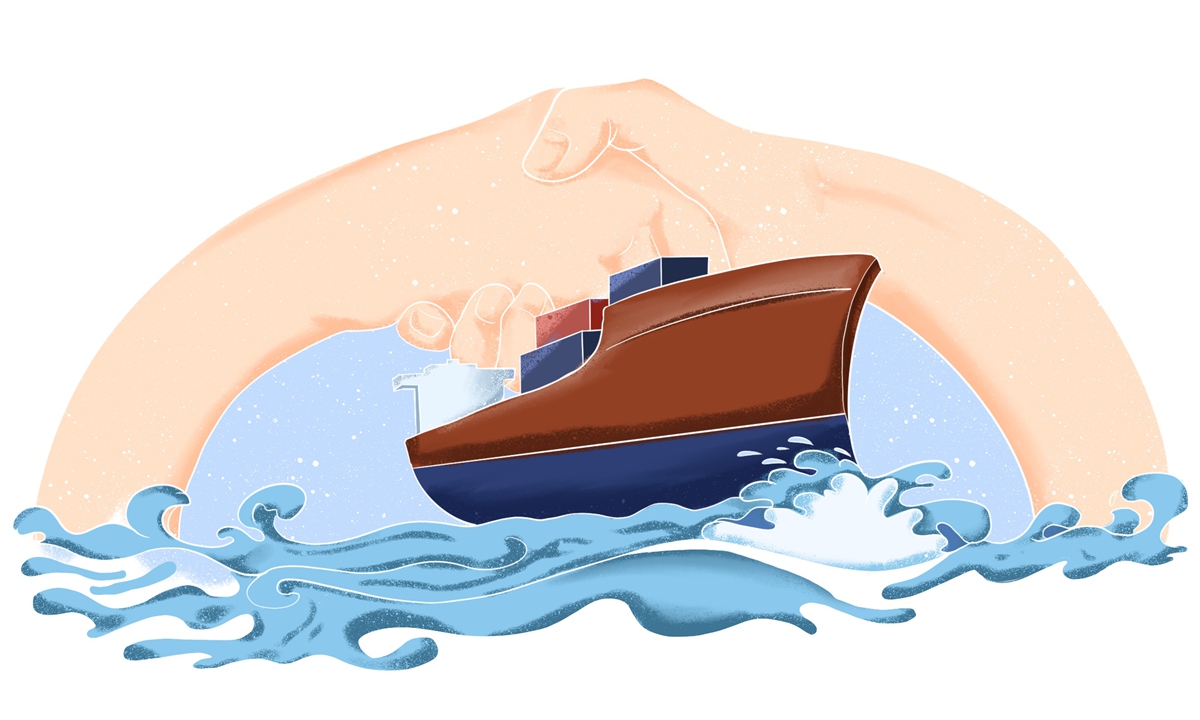
Illustration: Tang Tengfei/Global Times
Along the path of China growing into the world's second largest economy, its every step and achievement has drawn wide attention, especially internationally focused projects, which is always viewed with envy by the US and its allies."Not only does China itself own seven of the world's top 10 sea ports, but it has invested in, built or leased ports in at least 60 countries," US-based media outlet VOA reported, noting that China has managed to take control of the global strategic chokepoints "without shooting one bullet."
The truth is that China is currently the largest trading partner of over 120 countries and regions. According to data from China's Ministry of Commerce, the country's imports accounting for 11 percent of global import volume.
China's overseas economic and development cooperation on port construction was rolled out alongside its reform and opening-up since 1978 - a progress of China integrating into the global economy.
Through the unremitting effort joining hands with international partners to improve trade and investment facilitation, China realized high-speed economic growth, proving that integrating into global value chain and trading system is of great significance for both development and poverty reduction. It is why China has attached great importance to port construction for many years.
By building up or improving management of a port, such kind of cooperation does not only bring about improved infrastructure for partner economies; much more importantly, it is a chance for the countries to get hooked to the global trading system and benefit from it. These projects also create large numbers of good paying jobs for local residents.
In addition to infrastructure cooperation including ports, roads, railways, dams, and power stations, China has launched a number of cooperative initiatives with other countries and regions, covering areas including education, healthcare, as well as combating the pandemic. Based on mutual respect and mutual beneficial principles, the cooperation, without any political strings attached, has delivered tangible benefits to many economies.
China invested $2 billion to establish the Africa Growing Together Fund with the AfDB and the same amount to establish the China Co-Financing Fund for Latin America and the Caribbean with the IDB. By the end of 2018, these co-financing mechanisms had invested about $3 billion in nearly 200 projects covering water supply and sanitation, transport, agriculture and other areas, according to official report titled China's International Development Cooperation in the New Era.
Taking African countries for example, limited access to investment has been the biggest challenge to Africa's development, with an estimated annual infrastructure investment gap of $100 billion. China, by promoting infrastructure investment in Africa, improves interconnectivity not only within African countries, but also within the whole African continent, as well as to help them establish AfCFTA and integrate into global trading system.
In the meantime, China has stepped up efforts to boost aid to African and other developing countries which have been hit hard by Covid-19, especially when developed economies slipped into recession and diverted funding away from international aid and development programs.
Besides grants, China has also adopted more innovative approaches to boost foreign assistance, such as offering opportunities to share the growth dividend of its colossal market. The fourth China International Import Expo will be held in November, focusing on six key themes - food and agricultural products, vehicles, technical equipment, consumer goods, medical devices and healthcare.
The US-led western aid programs, by contrast, are focused on soft areas, such as governance capacity. However, their dogmatic "guidance" does not address the imminent problems of most low- and middle-income countries. So, after decades of assistance from the West, most of African countries are still facing development difficulties.
The article was compiled based on an interview with Song Wei, a research fellow at the Chinese Academy of International Trade and Economic Cooperation.






